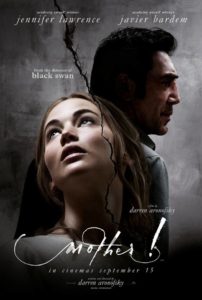Film Review: Mother!

Please note: this review contains a number of specific plot details.
Mother! is an exhausting allegorical film—sometimes moving, sometimes ridiculous. In truth, it’s more like a nightmare than a metaphor. Everything in it feels both incomprehensible and threatening.
Perhaps never has a story been so bad yet the film it’s embedded in been so impactful. Director Darren Aronofsky’s talent has always been more visual than dramatic. His central faith is thus always in his characters rather than his plots—see especially Noah (2014) and The Fountain (2006). He either doesn’t trust himself as a screenwriter to convey his message, or he doesn’t trust his audience to properly understand it. So he depends too much on his actors. In this regard Mother! is no different. Without Jennifer Lawrence’s bravura performance, Mother! would just be Noah 2: a biblically inspired rendering of environmental doom. Instead, it’s something better—even if it’s still nothing great.
[SPOILER ALERT!]
Mother!’s metaphorical mapping is fairly obvious. Mother (Jennifer Lawrence) is Mother Nature and her husband, Him (Javier Bardem), is God. Ed Harris and Michelle Pfeiffer’s characters—we never get their names—are Adam and Eve. Harris’s Adam is overindulgent. He drinks and smokes too much (and has a wound on his right side). Pfeiffer’s Eve is lecherous and eager to know the sexual details of Mother and Him’s relationship. Him invites Adam and Eve to stay at the couple’s home—carefully cultivated by Mother, who faintly protests them staying but eventually gives in. After some time, the Adam and Eve characters’ sons (Cain and Abel) arrive and, following scripture, one kills the other. Mother and Him host a wake for the dead son. The house is filled with strangers who eventually start trashing (as well as renovating) the place. Mother begs Him to make everyone leave, which he begrudgingly does. At this point, it begins pouring rain outside (the Flood).
The second half of the film is the New Testament. Mother is pregnant. Him—a famous poet suffering from severe writer’s block—finally finishes another poem. The media and Him’s fans begin showing up at the home. Mother tries to keep the aggressively intrusive guests out but fails. She again begs Him to make them leave but he loves their affections too much to turn them away. The house is overrun. Him’s fan-followers start looting, ripping off even chunks of the walls.
Here, the symbolism of the film begins to engulf its realism. Rave orgies, refugee cages, violent police-protestor confrontations, hooded mass executions, and cult rituals spawn up all over the house, which by then has been mangled beyond all recognition. In the finale, chaos meets the occult and allegory meets parody as Christianity’s conceptions of redemption, sacrifice, theophagy and lustration are mocked in one of the most visually discomforting scenes likely to come out of a big Hollywood studio.
Mother! has upset and impressed all the critics you expect it would. (The film has been a box office failure—earning only $7.5 million its first weekend—so hardly anyone besides them has seen it.) Conservative critics found the film’s violence pornographic and its parodic account of Christianity tawdry. More “sophisticated” critics found its storytelling ambitious and unconventional, its central message about humanity’s abuse of nature important, and its technical aspects impressive.
It’s hard to disagree with either group. The care that clearly went into every shot is admirable—as is the film’s thematic concern about the environment. And although he’s far outdone by Lawrence, Bardem gives a hauntingly subtle performance of an artist both burdened by the negative effects his creative process has on his wife, yet still too enraptured with its consequences to make any sacrificial adjustments. And the violence is indeed obscene and pretentious. Nothing is gained by having Lawrence get her face stomped on and her clothes ripped off while lunatics call her “slut” and “bitch.” If it’s supposed to symbolize humanity’s degradation of the planet, then Aronofsky is not only wrong but cowardly. There’s nothing easier than blaming the masses, but the problems of ecology we now face weren’t brought about because humanity is a merciless cult of imbeciles. At one point, the looters tell Mother that they’re stealing parts of the house “to show we were here.” Too busy with condescension, Aronofsky must not have noticed that most of his films cry out a similar insecurity.
Anti-human art can be just as sentimental as its opposite, and Mother! is an example of such simplistic psychology. Too contrived to be convincing and too elaborate to be enjoyable, the film will leave you with a vivid sense of the cruelty the human heart is capable of—one director’s in particular.
